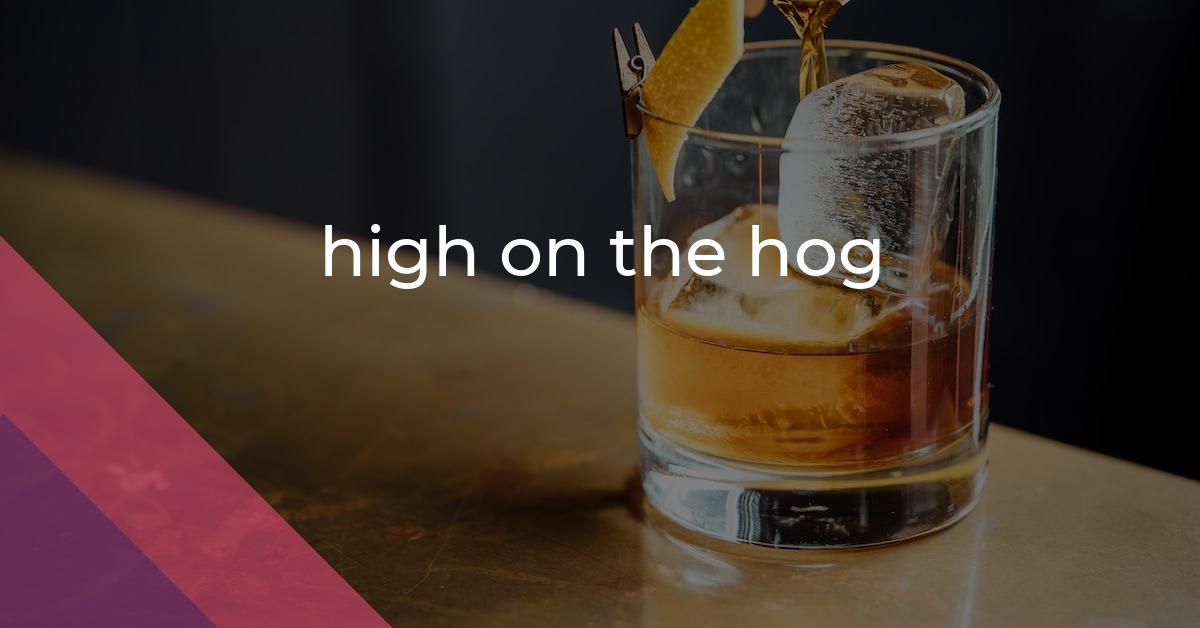high on the hog: Idiom Meaning and Origin
What does ‘high on the hog’ mean?
The idiom "high on the hog" means to live in a luxurious or extravagant manner, enjoying the best of everything. It originates from the idea that the choice cuts of meat, which are considered the best, come from the upper part of the pig.

Idiom Explorer
The idiom "lap of luxury" refers to a state of great comfort, wealth, and luxury. It suggests a life of abundance and indulgence.
The idiom "kill the fatted calf" means to prepare or celebrate in an extravagant or lavish way, especially to welcome someone or mark a special occasion.
The idiom "in high dudgeon" means to be in a state of extreme anger or resentment.
The idiom "in a pig's patoot" means in a difficult or unpleasant situation. It is often used to express frustration or annoyance. The exact origin of this phrase is unclear, but it likely refers to the idea of being in an undesirable or uncomfortable position, similar to being in a pig's hindquarters.
The idiom "I could eat a horse" means to be extremely hungry, indicating that one's appetite is so intense that they could consume a large amount of food, even as much as an entire horse.
The idiom "hog heaven" refers to a state of extreme happiness, contentment, or satisfaction, usually as a result of indulging in one's favorite activities or pleasures.
The idiom "hit the jackpot" means to achieve a great success or obtain an unexpected, significant gain, often in a financial sense.
The idiom "hit the high notes" means to perform exceptionally well or achieve success, often in a skill or talent that involves reaching a peak or climax.
The idiom "hit it big" means to achieve great success or win a large amount of money, often unexpectedly or after a long period of hard work.
Opulent Origins
The idiom "high on the hog" originated in the United States in the late 19th century and is commonly used to indicate wealth, luxury, or living in abundance. Its roots trace back to the agricultural practices of early American settlers. When a hog was slaughtered, the less affluent would receive the lower parts of the animal, while the wealthier individuals would acquire the choice cuts, which were "higher on the hog." This division symbolized prosperity and elevated societal status.
Over time, the idiom expanded beyond the realm of food to encompass overall wealth and privileges in various aspects of life. It became associated with a general sense of living a comfortable and abundant lifestyle. The phrase gained popularity in the 20th century and found its way into various domains of American culture, including literature, music, and everyday conversation. It became a metaphorical representation of achievement, success, and the rewards of hard work.
"High on the hog" also has another connotation, relating to assuming a superior or dominant position in a relationship or situation. In this sense, it expresses a feeling of superiority or command over others. It implies a sense of entitlement or the expectation of receiving preferential treatment.
Although the idiom has retained its original meaning of luxury and abundance, its usage has evolved to encompass broader connotations of prosperity and social status. This evolution has allowed the expression to remain relevant and adaptable in different contexts, offering individuals a versatile tool for self-expression.
The idiom "hog heaven" is closely related to "high on the hog." It is used to describe a state of extreme happiness or contentment, often resulting from being in a situation or environment that brings immense joy or satisfaction. When someone is in "hog heaven," they are experiencing the ultimate pleasure or enjoyment, similar to living a life of luxury and abundance represented by being "high on the hog."
Similarly, the idiom "have it large" is another related expression. It refers to living a lavish or extravagant lifestyle, often characterized by indulging in luxurious experiences and possessions. To "have it large" is to enjoy an opulent life where one can afford the best and most extravagant things, much like being "high on the hog."
The idiom "fat of the land" also shares similarities with "high on the hog." It signifies enjoying the best or richest of what a situation or environment has to offer. It refers to the abundance and prosperity that comes from having access to the most desirable resources. To be "high on the hog" is to bask in the "fat of the land," savoring the luxuries and privileges that come with wealth and success.
The idiom "high on the totem pole" provides another interesting connection to "high on the hog." While "high on the hog" relates to wealth, luxury, and abundance, being "high on the totem pole" refers to occupying a position of power, authority, or importance within an organization or social structure. To be "high on the hog" often leads to being "high on the totem pole." The opulence and success represented by the former can elevate one's social status and lead to greater influence and prominence, making them "high on the totem pole."
Lastly, the idiom "beef to the hoof" shares a connection with "high on the hog." "Beef to the hoof" refers to having a direct or very close connection to a particular resource or opportunity. It implies being in possession of something highly desirable or advantageous. In the context of being "high on the hog," enjoying the choicest cuts of meat from the upper part of the pig represents having access to the best and most desirable resources, making one "beef to the hoof."
The idiom "high on the hog" has its roots in the agricultural practices of early American settlers and signifies wealth, luxury, and living in abundance. It has evolved to encompass broader connotations of prosperity and social status, remaining relevant and adaptable in different contexts. Related idioms such as "hog heaven," "have it large," "fat of the land," "high on the totem pole," and "beef to the hoof" further highlight the themes of happiness, extravagance, abundance, power, and direct access to desirable resources. These idioms collectively showcase the interconnectedness of language and how a simple phrase can evolve and adapt to new meanings over time, providing individuals with versatile tools for self-expression and communication.
Example usage
Examples of how the idiom high on the hog can be used in a sentence:
1. After landing a high-paying job, she was finally able to live high on the hog and indulge in luxuries she had always dreamed of.
2. The CEO's extravagant lifestyle clearly showed that he was living high on the hog at the expense of the company's profits.
3. They won the lottery, so now they can afford to eat at fancy restaurants and travel the world, truly living high on the hog.
More "Food" idioms



